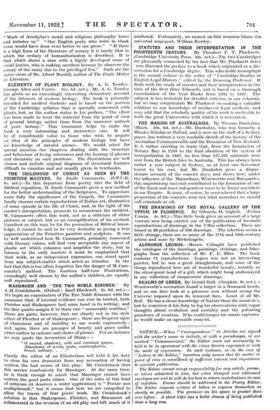MASSINGER AND " THE TWO NOBLE KINSMEN." By A. H.
Cruickshank. (Oxford : Basil Blackwell. 2s. 6d. net.)— We begin an examination of The Two Noble Kinsmen with the assurance that, if internal evidence can ever be trusted, both Fletcher and Shakespeare had some hand in its writing ; and the first quarto assigns it to these two " memorable worthies." There are parts, however, that are clearly not in the style either of Fletcher or of Shakespeare ; there are frequent signs of clumsiness and of inability to use words expressively ; and, again, there are passages of beauty and grace unlike either author in cadence and choice of phrase. For an instance we may quote the invocation of Diana :-
" 0 sacred, shadowy, cold and constant queen, Abandoner of revels, mute, contemplative, Sweet, solitary. . . ."
Plainly the editor of an Elizabethan will hold it his duty to clear his own dramatist from any accusation of having written the bad scenes of this play. Mr. Cruickshank does this service conclusively for Massinger. At the same time, lie is frank enough to admit that Massinger cannot have written the good parts either. One of the rules of this kind of criticism (it deserves a wider application) is " Poetae non multiplicandi," but it seems that here we are compelled to allow the traces of four poets' work. Mr. Cruickshank's solution is that Shakespeare, Fletcher, and Beaumont all collaborated in the revision of an old play and left much of it unaltered. Fortunately, we cannot on this occasion blame the universal scapegoat, William Rowley.


























































 Previous page
Previous page